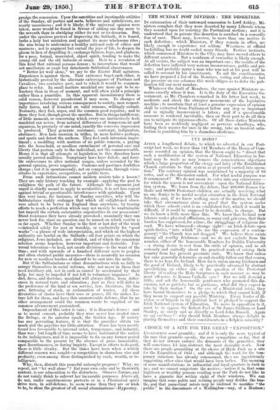nearly unanimous ; and it is likely, if the -universal
opinion were lusters complain that they were deserted by many Liberals whom taken, more would be found in favour of adding one day more to they counted upon for resisting the Puritanical motion ; and it is the seventh than in abridging either its rest or its decorum. But, understood that in private this desertion is ascribed to a cowardly under the specious pretext of improving the Sabbath, it is feared, fear of cant. There may, however, be more than one motive to lurks a holy but mistaken zeal against its more wholesome rites ; such defection ; which Ministers, if they remain in office, are the aim being to undermine a healthy national code of ethics and likely enough to experience not seldom. Weariness at official manners ; not to augment but curtail thejoys of life, to deepen its backsliding has no doubt cooled many Mends. Festive instincts, gloom in lieu. of dispelling it ; exchange fulness, hope, and gladness, which summoned Ministers to the City, may have moved others to for a poor, formal, macerated, abject spirit, lending to make the different quarters. But a residuum of cowardice is likely enough. young old and the old imbecile or crazy. Ita is to a revulsion of At all events, the subject was an important one ; the results of the this kind that rational persons demur ; to innovations that would defection have infficted very serious meonvenience, public and pri- not ameliorate or exalt but deteriorate Sabbatical observances. •rate ; and probably many a man who was not at his post will be " Better let well alone," we say to the Exeter Hall agitators. called to account by his constituents. To aid the constituencies, Experience is against them. That extremes beget each other, is we have prepared a list of the Members, voting and absent ; but historically proved by the alternate extravagance of Puritans and the pressure on our columns this week obliges us to defer the pub- Cavaliers, two centuries past, and to which it would be common- lieation till our next number. to refer. In small matters mankind are more apt to be re- Whatever the fault of Members, the case against Ministers ro-
sy than in those of moment, and will often yield a principle mains exactly where it was. It is the duty of the Executive Go- rather than a punctilio. In this apparent ineensiateneY there is vernment, as Mr. Chambers remarked in his letter last week, to solid reason, however paradoxical it may seem. To changes of moderate and check the abrupter movements of the legislative importance involving serious consequences to society, men respect- machine ; to ascertain that at least a genuine expression of opinion fay listen, and if founded on valid reasons, willingly submit shall be extracted from Parliament before any step so important Necessity, they feel, urges, and the common good requires ; and to and so signally inconvenient is taken; and if a questionable these they bow, though great the sacrifice. But in things indifferent, measure is rendered inevitable, then on their part to do all they of little moment, or concerning which every one instinctively feels can to mitigate its injurious effects. Of all these duties Ministers mankind can never, from natural differences of temperament and have been as recklessly negligent as perverse schoolboys, who, organism, be precisely of one mind, exactly the converse impression finding their master for once in the wrong, take an insolent satis- is produced. They generate resistance, contempt, indignation, faction in punishing him by a shameless obedience.


























 Previous page
Previous page